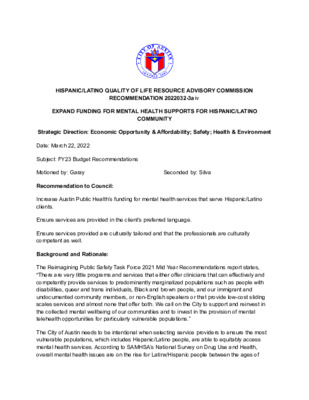RECOMMENDATION 2022032-003a: EXPAND FUNDING FOR MENTAL HEALTH SUPPORT FOR HISPANIC/LATINO COMMUNITY — original pdf
Recommendation

HISPANIC/LATINO QUALITY OF LIFE RESOURCE ADVISORY COMMISSION RECOMMENDATION 2022032-3aⅳ EXPAND FUNDING FOR MENTAL HEALTH SUPPORTS FOR HISPANIC/LATINO COMMUNITY Strategic Direction: Economic Opportunity & Affordability; Safety; Health & Environment Date: March 22, 2022 Subject: FY23 Budget Recommendations Motioned by: Garay Seconded by: Silva Recommendation to Council: Increase Austin Public Health’s funding for mental health services that serve Hispanic/Latino clients. Ensure services are provided in the client’s preferred language. Ensure services provided are culturally tailored and that the professionals are culturally competent as well. Background and Rationale: The Reimagining Public Safety Task Force 2021 Mid Year Recommendations report states, “There are very little programs and services that either offer clinicians that can effectively and competently provide services to predominantly marginalized populations such as people with disabilities, queer and trans individuals, Black and brown people, and our immigrant and undocumented community members, or non-English speakers or that provide low-cost sliding scales services and almost none that offer both. We call on the City to support and reinvest in the collected mental wellbeing of our communities and to invest in the provision of mental telehealth opportunities for particularly vulnerable populations.” The City of Austin needs to be intentional when selecting service providers to ensure the most vulnerable populations, which includes Hispanic/Latino people, are able to equitably access mental health services. According to SAMHSA’s National Survey on Drug Use and Health, overall mental health issues are on the rise for Latinx/Hispanic people between the ages of 12-49. In 2018, 56.8% of Latinx/Hispanic young adults 18-25 and 39.6% of adults 26-49 with serious mental illness did NOT receive treatment. According to the American Psychiatric Association, bilingual patients are evaluated differently when evaluated in English versus Spanish, and Latinx/Hispanic people are more frequently undertreated than whites. Hispanic children and adolescents are at significant risk for mental health problems, and in many cases at greater risk than white children. Barriers to accessing mental health care include lack of insurance or inadequate insurance; lack of knowledge/awareness about mental health problems and services available; cultural stigma associated with mental illness; language; lack of culturally tailored services and culturally competent mental health professionals; shortage of bilingual or linguistically trained mental health professionals; difficulties recognizing the first signs of mental illness; and problems identifying psychiatric symptoms when chief complaint is somatic symptom. For: Afifi, Solis, Garay, Ramirez, Perales, Silva Vote: Against: None Abstain: Vigil Absent: Peña, Garcia Attest: _________________________________ Amanda Afifi, Chair Reimagining Public Safety Task Force 2021 Mid Year Recommendations report - https://www.austintexas.gov/sites/default/files/files/Completed%20RPS%20Taskforce%20Mid-Y ear%20Recommendations%20Report.pdf SAMHSA National Survey on Drug Use and Health - https://www.samhsa.gov/data/sites/default/files/reports/rpt23249/4_Hispanic_2020_01_14_508. pdf American Psychiatric Association Mental Health Disparities: Hispanic and Latinos - https://www.psychiatry.org/File%20Library/Psychiatrists/Cultural-Competency/Mental-Health-Dis parities/Mental-Health-Facts-for-Hispanic-Latino.pdf